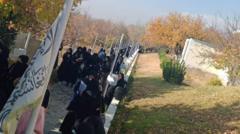Five education institutions across Afghanistan have ceased midwifery and nursing programs following Taliban orders, leading to emotional protests among trainees. With significant implications for women's healthcare and employment, Afghan women are facing a bleak future in education under the Taliban regime.
Afghan Women Face New Barriers in Pursuit of Midwifery Education

Afghan Women Face New Barriers in Pursuit of Midwifery Education
The Taliban's latest directive halts training programs for aspiring midwives and nurses, worsening the educational crisis for women in Afghanistan.
Women training to become midwives and nurses in Afghanistan are confronting a devastating setback, as reports emerge that the Taliban have ordered them not to return to classes. This move effectively brings an end to one of the few remaining pathways for women's education in the country. According to various institutions, students received directives to cease attending classes, with emotional responses captured in videos circulating on social media.
While the BBC has not yet received official confirmation from the Taliban's health ministry regarding this ban, the actions reflect a troubling continuity in the group's broader approach toward women's education, which has already barred teenage girls from secondary and higher learning since the regime regained power in August 2021. Despite previous assurances from the Taliban that girls would be allowed to resume their education under certain conditions, including the adaptation of an "Islamic" curriculum, those promises have yet to materialize.
In a sector where opportunities for women have become increasingly restricted, midwifery and nursing provided crucial avenues for employment and advancement. Under the Taliban's governance, male healthcare professionals are prohibited from treating female patients without a male guardian present, highlighting the necessity for women to have access to medical training.
Just a few months ago, access was granted to a Taliban-operating midwife training center, which enabled a dozen women to learn essential skills. Trainees expressed pride and dedication to their studies, understanding the vital role they would play in their communities. However, the sudden closure of training programs has created fear and uncertainty for approximately 17,000 women currently enrolled in similar courses.
Reports indicate significant distress among the students. Videos received by the BBC show women crying and expressing their worries about the future. A student in Kabul recounted being told to leave hurriedly and avoid congregating outside due to the potential presence of Taliban officials nearby. Many voiced their sorrow and disbelief as they faced the reality of lost opportunities.
The implications of this closure extend beyond individual aspirations, directly impacting women's healthcare in Afghanistan. The United Nations previously indicated that the nation required an additional 18,000 midwives to fulfill existing healthcare demands. With one of the highest maternal mortality rates worldwide, the report from the World Health Organization indicated that 620 women die for every 100,000 live births, underscoring the urgency for trained female healthcare providers.
As the situation unfolds, the future for aspiring female healthcare professionals within Afghanistan remains uncertain, characterized by systemic oppression and diminishing rights under the Taliban regime.





















